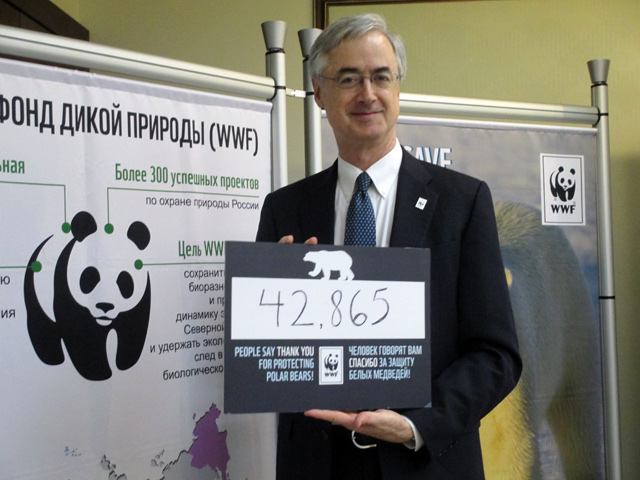
Over 42,000 voices for polar bears!
The appeal of polar bears transcends far beyond their Arctic home. When we asked WWF supporters to thank Arctic countries for their work to conserve polar bears and ask them to lead the way again, the message quickly spread to all corners of the earth – from Greenland to Argentina to Spain and Australia. Over 42,000 people have signed on. Today, we’re in Moscow to bring this global thank you card to environmental leaders from all five polar bear countries – Norway, Canada, Russia, Greenland (Denmark) and the United States.
It’s not hard to see why polar bears capture imaginations around the world. They’re an emblem of the Arctic, a powerful predator perfectly adapted to life in some of the most challenging conditions on earth.
To many, they’re also an emblem of threatened species. But in some ways, polar bears are a good news story. They’re still found around the pole, in roughly their original range, and in numbers estimated at 20,000 to 25,000.
The challenge before the polar bear countries now is to keep this positive story from becoming a cautionary tale. The biggest threat to polar bears is climate change. Sea ice – the habitat that polar bears require – is expected to reduce dramatically in the coming decades. By 2040, projections show only a fringe of summer sea ice remaining along the northern coast of Greenland and Canada – the Last Ice Area. In addition, less ice means more industrial development and shipping in the Arctic, further north than ever.
How can polar bear countries help the species adapt and thrive? Good management decisions must be based on solid science, and we have little information about many of the world’s polar bear populations. How many polar bears are there in understudied populations? Are they healthy? Are their numbers changing over time? We’re asking the range states to make this research a priority today.
Of course, all the research and management in the world won’t help polar bears if their habitat simply doesn’t exist. Keeping polar bear numbers healthy in the long term will require investment in renewable energy, not just by Arctic nations, but the global community. Luckily for polar bears, people around the world care about their future.
